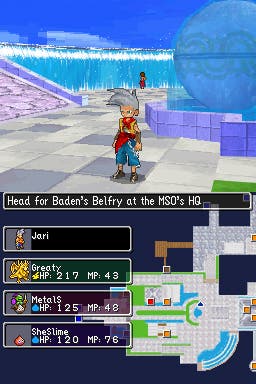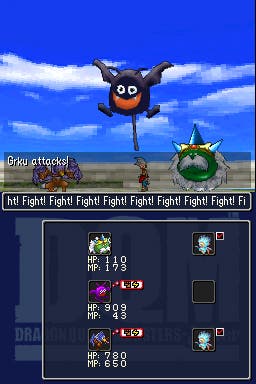Dragon Quest Monsters: Joker
Gotta catch 'em all! Wait, that's the other one.
The obvious comparison is Pokémon: when Dragon Quest Monsters was spun off from Dragon Quest proper, back in 1998, it was clearly, and pretty brazenly, inspired by Nintendo's pocket-sized behemoth. It combined the same top-down dimensions with the whole collect-'em-all shtick, and wrapped them up in a similar sort of RPG-lite. Now Dragon Quest Monsters: Joker has taken the series to two screens and three dimensions and it looks superbly fancy thanks to the sort of cel-shaded graphics that made Dragon Quest VIII such a joy to play. The design, however, remains fundamentally the same: wander round collecting monsters, fighting your way to the top of the latest monster-fighting tournament.
Apparently the game's producer, Taichi Inuzuka, wanted to compete with Dragon Quest VIII in terms of the game's visual appearance. Obviously the PS2 packs a bit more of a graphical punch than Nintendo's handheld platform, but within the limitations of the DS the game looks superb. It's got the same art style as Dragon Quest VIII, and it certainly matches it in terms of character design and so on. So the odd disappearing distant character, or blocky texture feels eminently forgivable, as you wander across seven islands to pick up enough darkonium to compete in a tournament to prove that you're the best at collecting (or scouting, as it's called in the game) monsters. But wait! It's the first year they've asked would-be scouts to collect darkonium. And your dad's asked you to carry out a top-secret undercover mission for him. And who's this Incarnus character, anyway?

And plot provides the basis for another collection marathon, except, as with previous Dragon Quest Monsters games, you can also breed (or synthesise) new monsters as well as just collecting them. The combat will be familiar to anyone who's played any other Dragon Quest title, from the design of the monsters and the nature of their special abilities to the turn-based structure. Over the course of those turns, you can issue your team of three monsters with specific orders, or you can just provide them with general tactics. And if even that meagre amount of strategic effort is too much for you, you can trust your monster AI to take care of things, which it does extremely effectively - to the extent that for most of the game you can just sit back and relax, saving your energy for tougher enemies and the inevitable bosses.
That, actually, is the game's biggest strength. If there's a videogame equivalent of easy listening, this is it - in a good way. It's one of those games that just lets you kick back and soak up the atmosphere and pootle around, and it makes that pootling such gentle, inoffensive fun that you don't want to stop. If there are never really any outstanding highs, there are also no correspondingly offensive lows, and there are plenty of pretty decent moments that are scattered across the game's neat little dungeons. One of them has you hitting switches to make the floor go up and down, for example, or there's one where you have to talk to mirrors to warp around locked doors. But none of them are too taxing, and it's easy to find yourself spending hours doing very little apart from wandering around looking out for new monsters.
The downside of that easy-listening approach, however, is that it's actually quite easy to find yourself bypassing the game's more interesting features. Even the game's core appeal - collecting monsters - feels entirely optional. Without Pokémon's matrix of paper-scissors-stone-style strengths and weaknesses, it doesn't feel like there's any real need to expand your party beyond your core monsters. Synthesis, meanwhile, is conceptually sound, but practically you can get by without ever investigating it too much.

In theory, the game's difficulty curve should encourage you to use synthesis to create more powerful monsters as you hit new islands. In practice, effective synthesis requires a fair amount of level-grinding, and by the time you've done that level-grinding your existing monsters tend to be strong enough to survive until the next new challenge. And while you're levelling up all your monsters, it's easy to find yourself equipped with so much coin that you can afford more healing items than you could ever need. Then it becomes easy enough to simply dodge all the intervening monsters before using your apothecary to grind out a victory against the next boss.
That highlights the game's biggest flaw: the sheer amount of level-grinding. There's always a certain amount of level-grinding in any RPG, but in Joker there is an exceptional amount - and the game does little to disguise it. No matter how well you play the game, there will come a time when you're reduced to stepping a foot outside the nearest Scout Hut, fighting some overpowered enemies, and then retreating back inside to heal. Or wandering all over an island and fighting a multitude of underpowered enemies in the hope of gaining enough experience points for your latest round of monster synthesis, or the next big boss encounter.
Partly that's because there's fundamentally less to do here than a lot of RPGs; less to interact with. It's difficult to shake off the suspicion that the game is a bit slight. You can get through the whole thing in little over 20 hours, which seems a bit short for an RPG - especially considering the amount of level-grinding. There's just not that much content here. The dungeons are short and simple, each of the islands is small, there are relatively few diversions to keep you entertained while plodding through the main plot, and that plot is itself pretty bare bones. But it's an entertaining diversion, nevertheless. It's difficult to switch off Dragon Quest Monsters: Joker - you go round, collecting and trading monsters, and you use them to fight other monsters, and while you're doing that, it's pretty enjoyable stuff. So it's difficult to get too annoyed with its lack of substance when that slender substance is somehow so compelling.
